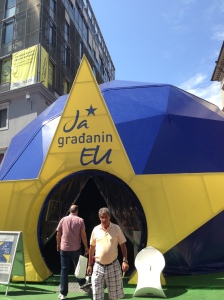Clearing customs for travelers crossing the land border into Croatia has been more intense this past month, featuring random bag searches and thorough questioning of passengers on trains and buses. The border patrol officers are “practicing for Schengen,” explained one young Croatian man who frequently takes the train from Budapest to Zagreb.
The Schengen Agreement covers the area of open, visa-free borders within Europe. These guards are training to move to Croatia’s other frontiers, which will soon become the borders for the entire European Union.
Croatia is set to join the EU as its 28th member today on July 1st. However, enthusiasm from within the EU and Croatia has dampened considerably with the economic downturn and recent eurozone bailout crises. Croatia is a young country that fought the bloody “Homeland War” for independence in 1991. That year 75% of Croatians favored joining what was then called the European Community. Now, more cynical Croats question why they fought so hard to separate from Belgrade only to relinquish sovereignty to an even more distant ruler in Brussels.
In January 2012, Croatia held a referendum on EU accession, in which 66% of voters approved of joining. One of the biggest attractions of becoming a part of the EU is access to an estimated 11 billion Euros in structural funds to help the country catch up economically. The EU has set up pavilions in a few Croatian cities for people to visit and gather more information and learn about the benefits of EU citizenship. Some young Croats are excited that they will be allowed to go elsewhere in Europe in search of better opportunity. Conversely Croatian officials are concerned about the possibility of a brain drain to the West.
One of the largest potential economic benefits of EU accession is that tourists from Western Europe will be able to enter the country with ease. This could provide a much needed boost to the country’s struggling economy. Yet, a hotel operator in the crowded coastal attraction city Dubrovnik reported, “we already have all the tourists we can handle.
The EU is just a way for Germany to control the little countries.” The sentiment that the costs of accession outweigh the benefits is reflected in recent polling, which showed less than half of Croats still favor joining. Many within the EU are also reticent to accept another country with fiscal difficulties and 20% unemployment.
Export driven industries are also skeptical of the benefits of EU accession. Sixty percent of Croatia’s exports already go to the EU, but with accession they will come under new regulatory restrictions. For example, Brussels has declared the famous Dalmatian dessert wine “Prosek” to have a name too similar to Italy’s “Prosecco.” Thus, despite qualitative differences between the beverages, Croatian wine growers will have to market their product under a different name.
EU accession ultimately underscores Croatia’s effort to separate from its Yugoslav past. As the borders with Hungary and Slovenia open, the previously easy crossings into Bosnia and Herzegovina will become much more difficult. It remains to be seen if this altering the economic relationships between Balkan countries will have a positive impact on lasting peace.












